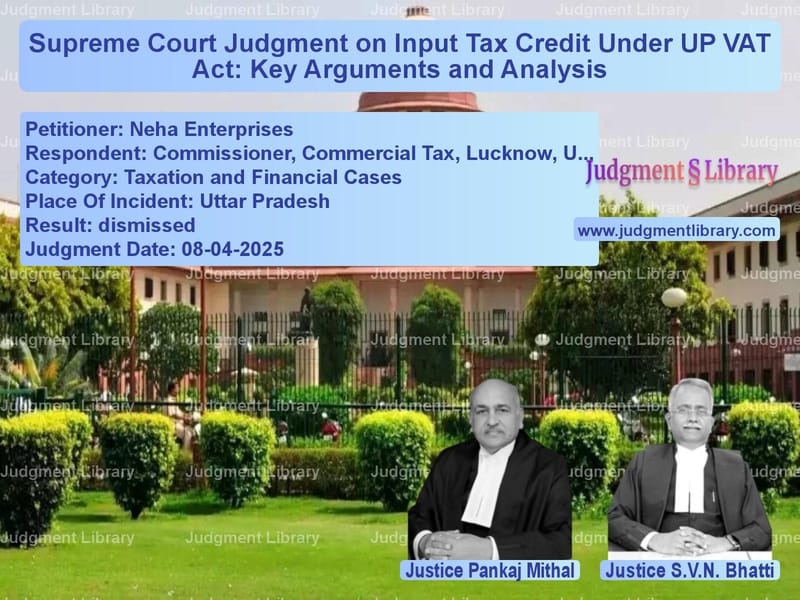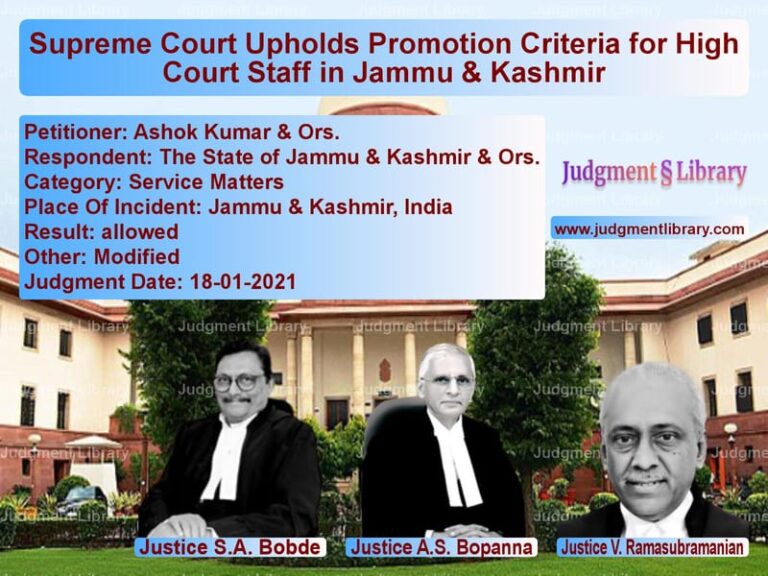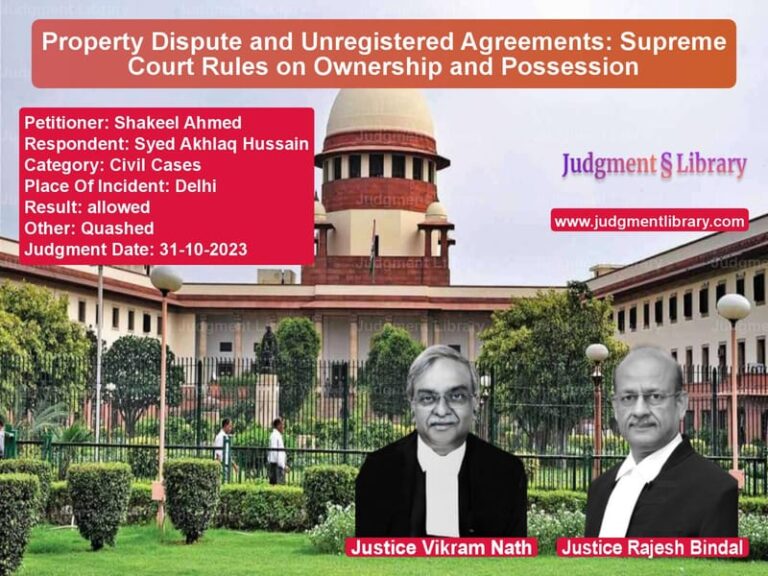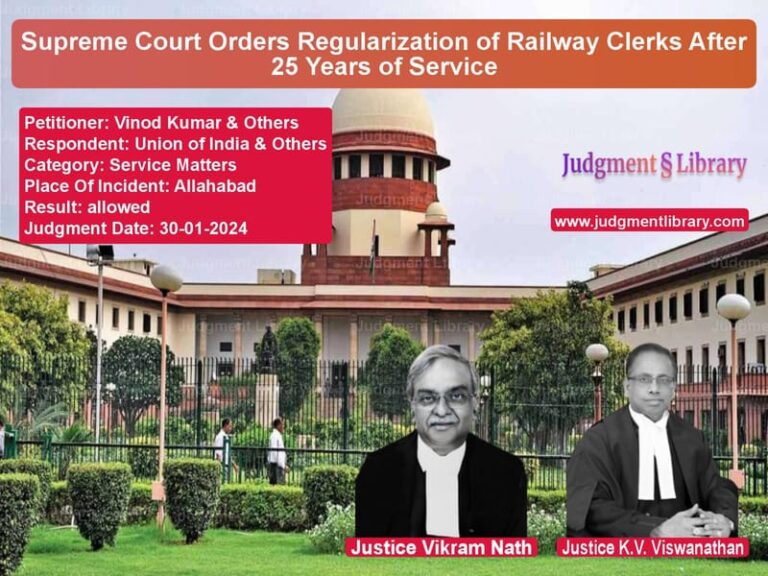Supreme Court Judgment on Input Tax Credit Under UP VAT Act: Key Arguments and Analysis
The Supreme Court of India recently delivered a significant judgment in the case of Neha Enterprises vs. Commissioner, Commercial Tax, Lucknow, Uttar Pradesh, addressing the contentious issue of input tax credit under the Uttar Pradesh Value Added Tax Act, 2008. The case revolved around the disallowance of an input tax credit claimed by the appellant, Neha Enterprises, for the assessment year 2010-11. The judgment, delivered by Justices Pankaj Mithal and S.V.N. Bhatti, provides a detailed analysis of the provisions of the UP VAT Act and the interplay between sections 7(c) and 13(7) of the Act.
The appellant, a registered dealer under the UP VAT Act, had recorded sales against the issuance of Form-E to a manufacturer-exporter, amounting to Rs. 1,89,35,100/-. The dealer claimed an input tax credit of Rs. 6,42,260/-. Initially, the assessing officer allowed the input tax credit, but later, through an order dated 22.02.2013 under section 28 of the Act, the claim was disallowed. The disallowance was based on the grounds that the dealer was not entitled to input tax credit for the purchase tax paid on sales turnover made in favor of the manufacturer-exporter.
The dealer contended that their case fell within the scope of section 13(1) of the Act, arguing that the turnover in question did not attract the proviso or exception covered by section 13(7). The assessing officer, however, held that the sales turnover made against Form-E was exempt from tax under section 7(c) of the Act, read with notifications dated 24.02.2010 and 25.03.2010. Consequently, the dealer was not entitled to input tax credit as per section 13(7) of the Act.
The dealer filed an appeal before the additional commissioner, which was dismissed on 22.07.2013. The first appellate authority upheld the assessing officer’s decision, stating that the notification dated 24.02.2010, corresponding to section 7(c) of the Act, exempted direct sales to manufacturer-exporters from tax but did not provide input tax credit to sellers. The Tribunal of Commercial Tax, Meerut, also confirmed this view in its order dated 10.09.2013, emphasizing that section 13(7) explicitly prohibits input tax credit in cases where sales are exempt under section 7(c).
The High Court, in its order dated 24.11.2014, dismissed the dealer’s revision petition, stating that a bare reading of section 13(7) clearly revealed that the applicant was not entitled to input tax credit for sales exempted under section 7(c). The High Court found no infirmity in the Tribunal’s order and answered the question of law in favor of the revenue.
In the Supreme Court, Mr. Udayan Jain, learned counsel for the appellant, argued that the denial of input tax credit was prima facie illegal and unsustainable. He contended that the notification under section 7(c) was issued to encourage manufacturer-exporters in Uttar Pradesh, and denying input tax credit to sellers would be counterproductive to this policy. He emphasized that section 13(7) should be interpreted in light of its intent, and the input tax credit should not be denied by applying section 7(c) and the related notifications.
On the other hand, Mr. Bhakti Vardhan Singh, learned counsel for the respondent, argued that the dealer’s case clearly fell under section 7(c) read with the notifications dated 24.02.2010 and 25.03.2010. He pointed out that the dealer, by filing Form-E, had recorded a turnover exempt from tax and was therefore disentitled to input tax credit by operation of section 13(7). He stressed that in the interpretation of taxing statutes, the intent does not form the guiding principle, and the clear expression of the law must prevail.
The Supreme Court, after hearing both parties and perusing the record, upheld the decisions of the lower authorities. The Court noted that the subject turnover of Rs. 1,89,35,100/- fell within the ambit of section 7(c) of the Act, read with the notifications dated 24.02.2010 and 25.03.2010. The Court emphasized that section 13(7) explicitly prohibits input tax credit where the sale of goods is exempt under section 7(c). The Court found no ambiguity in the provisions and concluded that the dealer was not entitled to input tax credit under the clear statutory mandate of section 13(7).
The judgment provides a comprehensive analysis of the relevant provisions of the UP VAT Act and underscores the importance of adhering to the statutory language in tax matters. The Court’s decision reaffirms the principle that tax exemptions and input tax credits are governed by specific statutory provisions, and any deviation from these provisions is not permissible, even if it appears to align with the broader policy objectives of the government.
Petitioner Name: Neha Enterprises.Respondent Name: Commissioner, Commercial Tax, Lucknow, Uttar Pradesh.Judgment By: Justice Pankaj Mithal, Justice S.V.N. Bhatti.Place Of Incident: Uttar Pradesh.Judgment Date: 08-04-2025.Result: dismissed.
Don’t miss out on the full details! Download the complete judgment in PDF format below and gain valuable insights instantly!
Download Judgment: neha-enterprises-vs-commissioner,-commer-supreme-court-of-india-judgment-dated-08-04-2025.pdf
Directly Download Judgment: Directly download this Judgment
See all petitions in Income Tax Disputes
See all petitions in GST Law
See all petitions in Tax Evasion Cases
See all petitions in Customs and Excise
See all petitions in Tax Refund Disputes
See all petitions in Judgment by Pankaj Mithal
See all petitions in Judgment by S.V.N. Bhatti
See all petitions in dismissed
See all petitions in supreme court of India judgments April 2025
See all petitions in 2025 judgments
See all posts in Taxation and Financial Cases Category
See all allowed petitions in Taxation and Financial Cases Category
See all Dismissed petitions in Taxation and Financial Cases Category
See all partially allowed petitions in Taxation and Financial Cases Category







